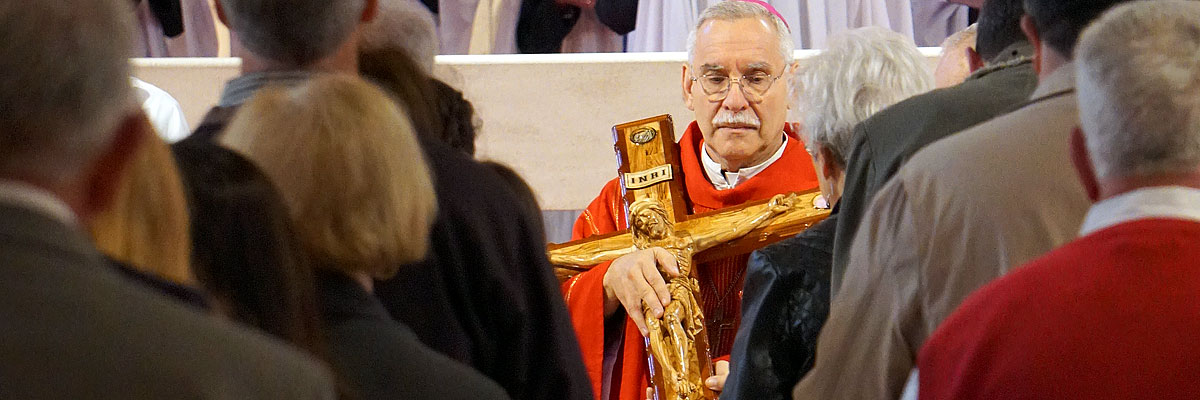Official Website of the
Catholic Diocese of Little Rock
13th Sunday in Ordinary Time, Year C
Published: June 26, 2016
Bishop Anthony B. Taylor preached the following homily at the Cathedral of St. Andrew in Little Rock on Saturday, June 25, 2016, and St. Michael Church in West Memphis and St. Anthony Church in Weiner on Sunday, June 26, 2016.

Bishop Taylor
When Cortez landed on the coast of Mexico, he ordered his men to burn the boats so there could be no going back — it was going to be all or nothing. This made them resolutely determined to accomplish what they had set out to do.
If Cortez hadn't burned the boats, his men would have fled when things got rough and they wouldn't have conquered Mexico.
That's a negative example of what our Scripture readings are talking about today. In our first reading we have the call of the prophet Elisha, who is resolutely determined to follow Elijah as his servant and successor. Rather than burning boats, as a farmer, he burned his farm implements so there could be no going back to his former way of life.
Like Cortez who burned his boats and Elisha who burned his farm implements, you and I must burn our bridges to eliminate everything that might tempt us to return to our former way of life when things get rough.
And Jesus says that it is the same for him and those who follow him: There can be no going back. Today's Gospel says that when the days for Jesus' being taken up were fulfilled, he resolutely determined to journey to Jerusalem, where he would accomplish what he had set out to do for our salvation.
And similarly, to would be followers who want to respond — but not quite yet — Jesus replies: It's all or nothing and now or never. One man says he'll follow Jesus once his father dies, but until then he feels bound by that prior obligation. Jesus replies: Let the dead bury their dead. Responding to God's call is a far greater and more urgent obligation: You, go and proclaim the Kingdom of God.
Another man says: Sure! But first he needs to say goodbye to everyone, tie up loose ends and get the approval of his family. Jesus replies: No one who sets a hand to the plow and then looks back to what was left behind is fit for the Kingdom of God. Following him is all or nothing and now or never.
Jesus calls you and me to be his followers as well. If we're going to respond appropriately to his call there can be no looking back. Like Cortez who burned his boats and Elisha who burned his farm implements, you and I must burn our bridges to eliminate everything that might tempt us to return to our former way of life when things get rough.
I've seen it far too many times: Your marriage will be destroyed unless you are resolutely determined to sever all ties to former girlfriends, give up your interest in pornography, avoid other sins and near occasions of sins — relationships that stir up desires that are harmful to your marriage, and we are easily self-deceived in such matters.
You won't stay sober for long unless you quit running around with your former drinking buddies — it's all or nothing. We tell our seminarians that they need to be "all in". The same applies to priests and religious, indeed anyone who aspires to be a faithful Christian. You'll never find meaning and purpose in life so long as you are still trying to keep your options open — it's now or never!
As Jesus says: No one who sets a hand to the plow and then looks back to what was left behind is fit for the Kingdom of God!









